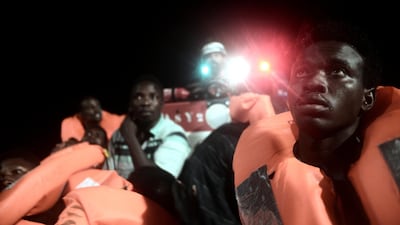The United States on Monday added its own sanctions to those imposed by the UN last week on six men linked to migrant trafficking from Libya, including two Libyan government officials accused of being masterminds.
Abd Al Rahman Milad, commander of a Libyan coastguard unit at Zawiya, 30 kilometres from Tripoli, and Mohamed Koshlaf, commander of security at the town’s refinery, were involved in mistreating migrants and sinking migrant boats operated by rival smugglers, the US Treasury said.
“Milad and other coast guard members have been directly involved in the sinking of migrant boats using firearms, some reportedly in an attempt to undermine the smuggling business of Koshlaf’s competitors,” the treasury statement said. “Milad’s unit has reportedly confiscated the boat engines of some smugglers who did not pay Milad, leaving them stranded at sea.”
Both officials are also accused of mistreating migrants at sea and in local detention centres: “A member of Milad’s local coastguard unit has been video-recorded striking migrants on a small rubber dingy with a bullwhip.”
The US report, following a similar UN report issued on Friday, makes grim reading for Italian and EU officials, who had pinned their hopes on tackling Libyan people-smuggling by supporting the country’s coastguard.
A memorandum of understanding signed between Italy and Libya’s UN-backed Government of National Accord (GNA) in February last year promised funding and training for the Libyan coastguard, with EU cash for migrant reception centres.
Instead, UN and US experts say the GNA is employing officials who are masterminding the people-smuggling networks.
“These brutal smuggling groups have tortured, robbed, and enslaved migrants seeking a better life. The United States is isolating these callous individuals from the US financial system,” said Sigal Mandelker, Under Secretary for Terrorism and Financial Intelligence.
The UN was equally scathing about the activities of the two officials, who were sanctioned along with two other Libyans and two Libya-based Eritreans.
One of the sanctioned men, Ahman Oumar Al Dabbashi, headed a militia with ties to ISIS that was involved in fierce fighting with rival groups around Zawiya for control of the migrant trade, UN investigators said. "Al Dabbashi is currently active around Zawiya, after violent clashes broke out with other militia and rival smuggling organisations around the coastal area in October 2017, resulting in over 30 deaths including civilians," their report said.
_______________
Read more:
Spain breaks deadlock after rescued migrants cut adrift
UN slaps sanctions on people smugglers in Libya
_______________
As Italy's new government takes a tougher line on migration, closing its ports to boats carrying migrants, its options for tackling smugglers in Libya are fast diminishing. The US sanctions make it an offence to have financial dealings with any of the six sanctioned men, meaning Italy might have to rethink its support for the Libyan coastguard.
The sanctioned smugglers have transported many of the 600,000 migrants who arrived in Italy over the past four years, with the International Organisation for Migration estimating that 20,000 drowned in the attempt.
The US sanctions highlight the failure of the GNA, installed in Tripoli in March 2016, to get a grip on migrant smuggling gangs. With no security forces of its own, it has proven unable to control either migrant smuggling or its own capital, which is held by rival militias who fight periodic battles for control of key districts.
UN Secretary General Antonio Guterres said the impetus for sanctions was footage broadcast by CNN last November that the news channel said showed slave auctions of migrants in west Libya.
“We were all horrified by pictures of human beings for sale in Libya last year,” Mr Guterres tweeted on Friday. “I welcome the Security Council’s decision to sanction six traffickers and smugglers. There must be accountability for exploitation and human rights abuses.”
Soon after CNN aired the footage last year, the GNA set up a committee and promised an investigation. To date, no such investigation has reported and nobody has been charged.
The chaos in western Libya is a stark contrast to the east, where the GNA’s rival, the House of Representatives parliament, holds sway from the town of Tobruk. The Libyan National Army loyal to the parliament, commanded by Field Marshal Khalifa Haftar, has largely vanquished militias in the east, and is now battling to seize the last militia holdout in the coastal town of Derna.
The anarchy in west Libya is an obstacle not just to hopes of tackling migrant smuggling, but to ending the country’s civil war.
An agreement to hold elections in December was brokered by French president Emmanuel Macron in Paris on May 29, but some diplomats fear that a fair poll will be next to impossible while western Libya is controlled by a patchwork of rival warlords.

